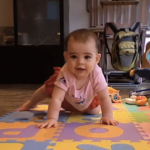Infancy: Grabbing Independence
My son and daughter-in-law have produced a video of their baby girl’s attempts to crawl. She rocks back and forth, happy yet apprehensive, not knowing quite how to start. She tries, falls on her face, gets up and tries again, while her mother holds out her hands in encouragement. [Cute, isn’t she?]
What if she had given up after the 15th or 20th or 30th time she tried? Would she be pulling herself up now, about to walk? Why has she kept on, when each stage is so difficult, sometimes taking weeks or months from when she first tried it?
Why? Because somehow she knows that if she doesn’t turn over, doesn’t keep trying to crawl, or to walk – despite the danger of falling – she will always be physically dependent upon her parents.
Childhood and Adolescence: Slowing Down. Maybe if we could remember through our childhood, adolescence and young adulthood what a struggle it was to gain our physical independence as infants, we would pay more attention to keeping it.
In America, that’s not happening. A study by the National Institute of Health indicates that adolescents between the ages of 9 and 15 decrease their level of moderate to vigorous physical activity (MVPA) from 3 hours (180 minutes) per day to 49 minutes per day, with only 35 minutes per day on the weekend. The recommended minimum is 60 minutes a day (Dietary Guidelines for Americans). At ages 9 and 11, more than 90% were meeting that minimum. At age 15, only 31% reached the minimum on weekdays, 17% on the weekends.
The Middle Years: Spreading Out. You’ll find a calculator at Discovery Health that estimates your Basal Metabolic Rate (BMR), the number of calories you’d burn if you slept all day. By entering each age in the appropriate box, you’ll see that at age 21 you burn about 100 more calories per day than at age 41. That means – at 3500 extra calories per pound gained – if you continue to consume the same calories you did at age 21 -without increasing your physical activity – you’ll gain about 10 pounds a year. [Sound familiar?] At the same time, you lose stamina and strength – not easy to recover.
The Later Years: Feeling the Neglect. We cannot overcome some aspects of our aging bodies. In a study of “Australian independent urban-dwelling women” between the ages of 20 and 89, researchers found that “Age was the most potent predictor of muscle strength, and even the strongest women in each age group were unable to maintain the strength of the young women.”
However. In their comparison of active and inactive women, they concluded that an active woman can have a 10-year advantage over one who is less active. If you’re active, everything’s easier. The stronger your muscles, the less effort it takes to do what you need to do.
Unfortunately, this is often the age when we stop moving. Even at a rate of only one pound gained a year, we’re 40 or more pounds overweight, with hip and knee problems. Often we just don’t feel like it. Been there, done that, and now it’s time to rest.
Maybe we can learn from our youngest grandchildren. They happily engage in the struggle, knowing it’s worth it in order to gain physical independence.
Can’t we work just as hard – with just as much enthusiasm – to keep it?


I just love that video…and the music in the background just brings tears!!
I could — and do — watch that video over and over again, Phyllis. She is just so happy to be alive and (literally) kicking! I want to feel like that!
I recommend dancing, too. Not only is it a fun way to move, but there’s more balance involved. I think the “dancing” I do with the chorus, as bad as I am at it, is very good for my general health.
Dancing ‘s something that children do, too, when you think about it. I avoided it when my kids were home, because they (sob, sob) would laugh at me. But now — why not? Thanks for that suggestion, Yvonne.
And you are such a good dancer, Cheryl!! Ya got rhythm!
Pingback: Changing as We Age | Aging in Wonder
Pingback: Changing as We Age | Cheryl's Desk